March 2018
Jenn Arbogast: Advancing Scholars, Assisting Students
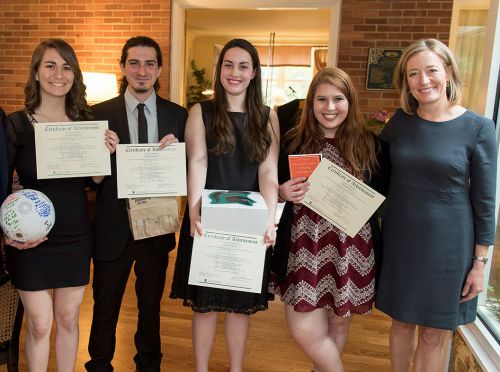
The Academic Coordinator for the Social Science Scholars Program explains some of her responsibilities and favorite aspects of her job.
As the Academic Coordinator for the Social Science Scholars Program, I do a lot more than simply tell students what classes to take, as the name might seem to imply. My job encompasses a large range of responsibilities, including connecting students with on-campus resources, working with communication staff to keep students well-informed, reaching out to prospective Scholars and the alumni who do so much for our students, and assisting in planning and budgeting for the yearly study abroad trip. The most important aspect of my job, however, is simply stated: looking out for our students.
Working with the Scholars and seeing them succeed is what makes my job so rewarding. Each year, we invite around 20 new Scholars to join the program, and with each new cohort comes an entirely new set of ideas, passions, fears, challenges, opportunities, and potential. It’s my job to help foster their aspirations while making sure that anxiety is kept to a minimum, both in their personal and academic lives. Our scholars are some of the most active, involved students on MSU’s campus, but sometimes that makes them prone to feeling burned out or overwhelmed. If there are any problems in their lives that are causing them distress or to lose confidence, my door is always open and I am always happy to help guide them through whatever challenges they face or identify other resources that are available to them.
But, of course, keeping the students academically on track is important, too, and that’s another aspect of my role that I take very seriously. As I said earlier, the Scholars are a heavily engaged group and they go above and beyond academically: it is entirely normal for our students to be double-majoring in subjects even out of our college. Many are also seeking external volunteer, extra-curricular, and internship experiences pertaining to their major. I’m here to help with any and all of those things. In addition, I help to assign mentors to them – both community mentors, who are usually MSU faculty or alumni established in a field matching the student’s interest, and peer mentors, who are some of the upperclassman Scholars who volunteer to lend a hand to those just starting out. Assisting them in finding their way on their path towards graduation and connecting them with resources and opportunities along the way will set them up for a much more successful future, while also allowing for a diverse range of experiences while they’re still here at MSU.
After being a part of this program and working with the amazing people who make it happen and the awesome students we do it for, I couldn’t imagine doing anything else. Though it is always busy and sometimes stressful, to see our program take off and our students succeed makes it all worthwhile. I’m so proud to be a part of the Social Science Scholars Program and I can’t wait to meet the fifth cohort that will be arriving in the fall.
Freshman Cohort: Research Topics
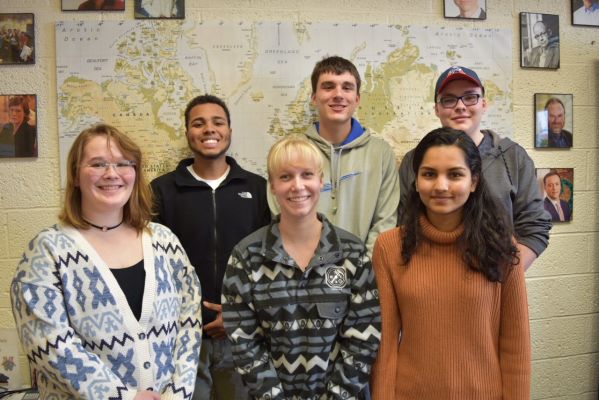
Different freshman Scholars give insight into their research focus for the upcoming year.
A major component of the Social Science Scholars experience is completing a research article. This is not meant to be “busy work” for the students, but instead gives them an opportunity to learn more and build their resume and expertise in an area about which they are passionate. Enormous freedom is given to the Scholars, as they are able to choose to work in a group or independently, what methods they use, and of course, what topic they explore. The interests of the students are widely varying, and the topics they come up with are as impressive as they are interesting. Below are just a few of the subjects that this year’s cohort have chosen to explore:
Samyuktha Iyer, an economics major, is taking a deep dive into American food consumption and its impact on the environment.
“My study will use behavioral economics to study what methods influence consumer food choices. I want to “nudge” people to choose foods that contain less meat and dairy because animal agriculture is a huge contributor to global climate change. Modern agriculture generates a large percentage of greenhouse gas emissions, deforestation, and water pollution as well as promoting monoculture, the overuse of pesticides, and antibiotic resistance. If people choose to consume fewer animal products, economic demand for them will decrease, leading to lower levels of production. I read Richard Thaler’s book Nudge in which he discusses human psychology and many of the irrational things we do that traditional models of economics fail to take into account. He states these are the situations where humans need “nudges” to choose what will be more beneficial to them and everyone else. This fundamental idea is what I am applying to a collective problem we have today: climate change. The ‘Tragedy of the Commons’ is a widely studied problem that has manifested in climate change. It states that all individuals in a group will use as much of a limited resources as they can because they will derive all the benefits whereas the costs will be shared by all. We can see this phenomenon play out in how people choose to continue consumption of products that are harmful to the environment because they assume someone else will mitigate the effects or that one person’s altruism will be exploited by everyone else. The result is that the problem continues virtually unchecked. So, my study tests whether there are nudges that can induce a change in their behavior, hopefully at least reducing some of the harm still done to the environment.”
Lockie Woods, a Criminal Justice/History double major, is looking at the historical value of the game Cricket.
“This research project is an investigation into the role cricket plays in the process of nation building in former British colonies. Sports, and especially cricket, can have significant impacts in the fields of culture and politics. While cricket is almost nonexistent in the United States, throughout the former British empire it remains one of the most popular sports. Cricket’s survival after decolonization and the end of the British empire is a testament to its influence in the developing colonies. Colonial independence would seemingly call for a move away from the ruling culture towards a new national identity. However, cricket avoided this trend and its influence only grew with the breakup of the empire. The purpose of this study is to explain the continued popularity of cricket throughout the former British empire. This sport of relatively unclear origins has a tight hold on two of the most populous countries in the world (India and Australia), it survived the brutal partition of a nation (India and Pakistan), and has united a group of islands separated by more than 1,000 miles (West Indies). This research project will attempt to explain why this particular sport, so strongly associated with colonial regimes, become an ingrained cultural and political institution across so much of the globe.”
Nathaniel Penning, a psychology major, is interested in exploring the American criminal justice system and its ties to race as well as ways in which it can be reformed.
“My project focuses on Michigan’s incarceration system and how it is deeply relevant to racial injustice, as American incarceration has a long history of preying on and abusing minority populations. The project aims to inspire change to a harmful administrative rule, and prison reform is very much a racial issue. We will be presenting a poster at a conference in March that establishes a link between levels of prison visitation and effective rehabilitation, explores alternative successful means of prison discipline, and offers a comparative analysis of visitation policies in different states.”
Billy Wetzel, a James Madison student also pursing history, is comparing and contrasting Detroit and Pittsburg – two cities with similar pasts, but very different presents and futures.
“My research project is a comparative analysis of the deindustrialization of Detroit and Pittsburgh. Because both of these cities were keystones for the ‘Arsenal of Democracy’ that helped the Allies win World War Two, I believed that they make for a telling and useful comparison. Furthermore, each city was regarded as a leader in a particular field of manufacturing, for Detroit it was automobiles and for Pittsburgh it was steel. The overall goal of my research project is to explain the different ways that Pittsburgh and Detroit responded to the deindustrialization of their cities and to discuss how these responses have continued to play a role in shaping both cities. Since Detroit and Pittsburgh have arrived at two drastically different outcomes in the wake of deindustrialization– Detroit had to declare bankruptcy in 2013 and Pittsburgh was named the world’s most livable city in 1985 and 2009 – an analysis of their different trajectories will help me to explain these disparate outcomes. In addition to analyzing the policies employed, I will also examine factors such as civic culture, race relations, and political structure to examine how each city’s choices were limited by historical and structural factors.”
Sarah Dec, a psychology major, is focusing on language with her own unique approach:
“My research began as investigation of whether there are differences in how an individual’s native language affects his or her perception of other languages. It turns out there is a large body of scientific research devoted to investigating language perception differences. Some of the clearest results focus on phonology—the systematic organization of sounds in languages, specifically in respect to cognitive representations. There are empirically significant differences between languages in the way sounds are interpreted and stored, and an individual’s native language can predict how the patterns of their phonology will manifest. One phenomenon of native language bias in the perception of other languages is the tendency to hear a vowel where there is not one, or to not hear a vowel where there is one. The phonology of an individual’s native language effects the manifestation of this “illusory vowel” phenomenon; in many cases, illusory vowels are predicted by the stress patterns of the native language. Because of my background in rhythm perception research, I’m curious as to whether illusory vowels affected by stress are also somehow tied with rhythmic perception. I will be investigating this question using a paradigm that matches phonetic tokens and rhythmic sequences in stressed and unstressed beats, whereby rhythm and language can be directly compared. This will allow us to assess the salience of rhythmic effects on illusory vowels.”
Lastly, Gabby Kinding, a double-major pursuing Political Science and Psychology, is looking at secondary education and how it is impacted by power and privilege.
“My research seeks to determine how federal and state implemented educational policies perpetuate structural discrimination against urban schools and what sociopolitical-economic factors allow these policies to persist. Fred Pincus defines structural discrimination as when the policies and institutions of the dominant cultural group are neutral in intent, but still have adverse effects on minority populations. Using this concept as a framework, I'll continue to examine structures of power and privilege in the United States, and apply them to our secondary education system, where decisions about curriculum, high stakes testing models, funding, and other issues may fail to take into consideration the socioeconomic factors that affect success in urban schools, thus prescribing policies that punish these schools in a myriad of ways. Additionally, I'll examine public awareness and attitudes, representation in politics, and other social and political factors which contribute to the disconnect between policy makers and the urban schools they serve.”
Allie Pail: Our Surroundings are our Classroom
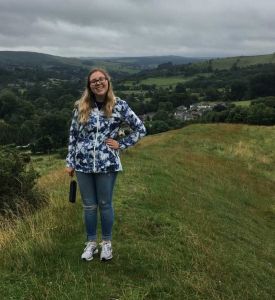
A sophomore Scholar shares her favorite memories and experiences from her cohort’s study abroad trip to the U.K.
Studying abroad with Michigan State University has been the best learning experience of my college career so far. Last summer, I traveled with the Social Science Scholars Program to various parts of England, beginning in London’s busy streets and ending in the serene Lake District. One of my best memories from the trip is in the Lake District; instead of having a typical class day, a group of students and our two professors hiked to the top of Harrison Stickle, the large mountain behind our hotel.
We began early in the morning with steep rock steps that led us to a refreshingly chilly tarn where we stopped to eat lunch and swim.
The next terrain we tackled contained stretches of mud and large rocky passes that led us further up the mountain.
After several stops along the way to catch our breath and regroup, we all successfully made it to the top of Harrison Stickle three hours after we began. The group rested for a few minutes, and I was soaking in the feeling of accomplishing something I never thought I would be capable of.
We then proceeded to take a seat around our professors and have class, in the presence of an amazing view. Dr. Alan Arbogast spoke about the geography of England and how mountains like Harrison Stickle were formed; this lecture was unlike anything I experienced at Michigan State because we were sitting in the middle of the very landforms Dr. Arbogast was talking about.
We did not have to examine pictures on a slideshow or in a textbook to understand what Dr. Arbogast was discussing – instead, we could glance up and look at the landscape around us. Elsewhere in the UK we had the same opportunity to see what we learning about: the remains of Roman Britain, the place where the then-king was obliged to sign the Magna Carta, and the ruined cotton mills which mark the beginning of industrialization. As a history major I enjoy learning about events from the past and how they influence the present and future, but nothing will ever compete with learning about history in the very place it occurred. I am so thankful to the Social Science Scholars Program, Michigan State University, and the Office of Study Abroad for sponsoring trips around the world, and for giving me the opportunity to enrich my education through immersion in another country, its rich history, and its beautiful landscape.
Megan Jursch – Granting New Scholars a Great Experience
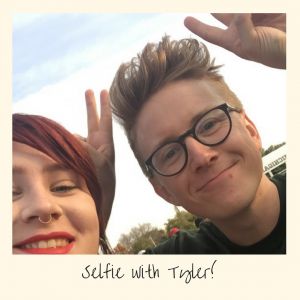
A junior Scholar shares some of her experience interning how the program helped her to seek out those opportunities.
When Dr. Waller and Jenn asked me to help put together this newsletter, what else could I say but ‘yes’? As a student worker for the College of Social Science’s communications team, it’s part of my job. And not only that, it’s part of a job that they helped me get. I only really had one choice here. But it’s also worth noting that, even if I didn’t have this job, I’d have agreed to undertake this task regardless. The program has done so much and opened so many doors for me, it’s the least I could do.
Because of the Scholars Program, I’ve managed to land three amazing jobs/internships since my sophomore year, and I’m currently working on obtaining my fourth over the upcoming summer semester (and maybe a fifth in the fall!). For a junior, that’s not bad going.
I have to give myself a little credit here – I wasn’t handed these internships through the program. But what I gained each case was a connection, and for social science students, connections are everything. These aren’t people who are going to set you up with your lifelong career, but they will be able to help you identify the first few steps to getting those much-needed experiences – and with new opportunities like your first couple of internships, that assistance is crucial.
By the end of the fall semester of my sophomore year, I was itching to start interning, but I wasn’t sure exactly how to get started. Dr. Waller helped set me up with Sara Bijani from the Center for Gender in Global Context as well as the College of Social Science’s communication coordinator (at that time, Rick Seguin), and from there, the baton was passed.
I went through the rest of the process myself as far as researching positions, interviewing and accepting two positions – one with the Women’s Center of Greater Lansing and one with the College of Social Science’s communications unit. However, without those initial meetings, I can’t imagine I would have found such good internships that matched my interests so closely. I am still working for CSS communications, under new leadership, and though my internship with the Women’s Center of Greater Lansing only lasted a semester, I replaced it with an internship with the MSU Department of Communications and Brand Strategy. That internship was something I first heard about through my community mentor assigned by the Scholars program, Lisa Mulcrone, and has turned out to be another great interning opportunity.
The experience I’ve gained from these internships has been invaluable. As much as traditional classroom teaching can expand a student’s understanding of a topic, nothing beats the ability to learn by doing. The day-to-day practice you can get from actually putting your knowledge and skills to work will do more to boost your understanding and confidence than any class ever can, and seeing a direct result on the people around you from your own effort is more rewarding than any grade could ever be. I am so thankful for the program for helping me to find and connect with these opportunities, and I can truly say I am a better student because of it.
Calla Michalak: Where I’ve Been, Where I’m Going
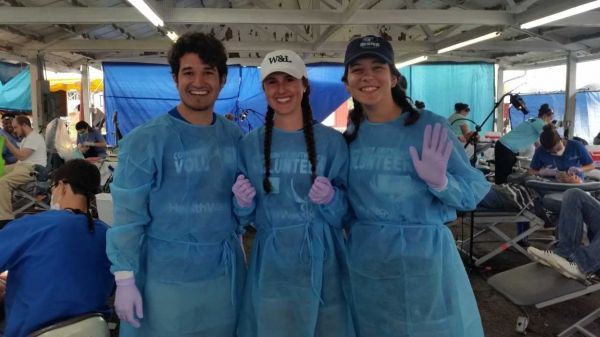
A senior Scholar reflects on her undergrad experience and her future plans moving forward.
When I got to Michigan State my freshman year, I knew that I was interested in healthcare. Part of the reason that I chose to come to MSU in the first place was because our cohort’s focus was on global healthcare in a social science context. Spending time learning about methods of healthcare delivery around the world, as well as different policies regarding health insurance helped to affirm my desire to become a healthcare professional.
Beyond the classroom and study abroad, I was also lucky enough to gain valuable internship experiences after both my sophomore and junior years of study. After my sophomore year, I was able to spend two months working with community health organizations in Riobamba, Ecuador. I spent time both in a hospital setting, working with nurses and observing operations, and riding public buses into the mountains to visit patients in their own homes who could not travel. The following summer, I spent two months working with nurse practitioners in Hyden, Kentucky through Frontier Nursing University’s Courier Program. I was given the opportunity to shadow a Nurse Practitioner one-on-one in a primary care setting and was also able to work and learn within a hospice setting.
Both of these experiences have profoundly shaped my future career goals. While in Ecuador, I was made aware of some of the glaring inequalities that are present in healthcare settings. Initially, this led me to believe that I would be able to help the greatest number of people if I chose to work abroad as a healthcare professional. My time in Kentucky, as well as the excellent mentorship that I received from both Dr. Waller and my colleagues in Hyden, helped me to realize that I could be provide just as much help, if not more, if I worked domestically. Following the completion of my BS in Psychology in May, I will be entering a 2.5 year Accelerated BSN + MSN combined program at Emory University. I will be studying to become a family nurse practitioner, potentially with an additional focus on women’s health. I have also accepted one of five palliative care fellowships offered to Emory students entering this program annually. Once I have finished my program, I hope to spend the bulk of my career working in medically underserved communities in the United States. The Scholars program and the guidance of Jenn and Dr. Waller have been invaluable in helping me define and achieve my career goals.

